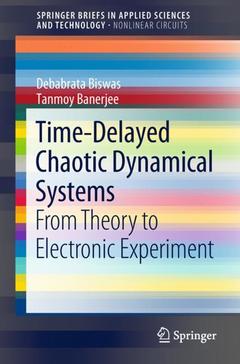Description
Time-Delayed Chaotic Dynamical Systems, 1st ed. 2018
From Theory to Electronic Experiment
SpringerBriefs in Nonlinear Circuits Series
Authors: Banerjee Tanmoy, Biswas Debabrata
Language: English
Subject for Time-Delayed Chaotic Dynamical Systems:
52.74 €
In Print (Delivery period: 15 days).
Add to cartSupport: Print on demand
Description
/li>Contents
/li>Biography
/li>Comment
/li>
This book describes systematic design techniques for chaotic and hyperchaotic systems, the transition from one to the other, and their implementation in electronic circuits. It also discusses the collective phenomena manifested by these systems when connected by a physical coupling scheme. Readers will be introduced to collective behaviours, such as synchronization and oscillation suppression, and will learn how to implement nonlinear differential equations in electronic circuits.
Further, the book shows how the choice of nonlinearity can lead to chaos and hyperchaos, even in a first-order time-delayed system. The occurrence of these phenomena, together with the efficiency of the design techniques described, is presented with theoretical studies, numerical characterization and experimental demonstrations with the corresponding electronic circuits, helping readers grasp the design aspects of dynamical systems as a whole in electronic circuits. The authors then discuss the usefulness of an active all-pass filter as the delay element, supported by their own experimental observations, as well as theoretical and numerical results.
Including detailed analysis, as well as computations with suitable dedicated software packages, the book will be of interest to all academics and researchers who wish to expand their knowledge of the subtlety of nonlinear time-delayed systems. It also offers a valuable source of information for engineers, linking the design techniques of chaotic time-delayed systems with their collective phenomena.
Dr. Debabrata Biswas obtained his PhD from the Department of Physics, University of Burdwan in 2017 and currently serves as an Assistant Professor at Rampurhat College, India. His research interests include nonlinear time-delayed systems, their design and coupled behaviors, theory and experiments on birhythmic oscillators and their control. He has published more than 10 research articles in various reputed journals, such as Physical Review E, Chaos and Nonlinear Dynamics, and has presented his research at several international and national seminars and workshops. He has been selected to participate in the workshop “Multistability and Tipping: From Mathematics and Physics to Climate and Brain” at the Max Planck Institute for the Physics and Complex Systems, Dresden. Dr. Biswas received research funding from the Council of Scientific & Industrial Research (CSIR) (India) as a Senior Research Fellow.
Dr. Tanmoy Banerjee has been an Assistant Professor at theDepartment of Physics, University of Burdwan, India since 2006. His research interests include nonlinear dynamics, complex systems, time-delayed chaotic and hyperchaotic systems, and mathematical biology. He has published 52 research articles in many reputed peer-reviewed journals like Physical Review E, Chaos, Europhysics Letters, etc. Dr. Banerjee has been invited to visit the Institute for Theoretical Physics, Technical University of Berlin as a visiting scientist, and has delivered invited talks at various seminars and schools related to nonlinear dynamics. At present, he is the principal investigator of a major research project on nonlinear time-delay systems funded by the Science and Engineering Research Board (SERB), Department of Science and Technology, India. Dr. Banerjee is a recipient of the University Gold Medal and National Merit Scholarship. His research group at the “Chaos and Complex Systems Research Laboratory” has contributed many pioneering advances in the field ofno

